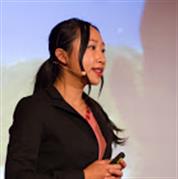On the International Women’s Day five years ago, I sat in front of my computer, scrolling through my Facebook news feed. Incredible stories of people fighting for gender equality made me think about my own heroine. I was raised by my grandmother, who, amid conflict and poverty, lost the chance to be educated and still cannot read and write. She has done so much in her life to fight for equal rights, so that her granddaughter can have it easier. But as I scrolled through my news feed, I thought – how can her story be heard on a global stage?
Through photography – through equipping marginalised women like her with the universal language of photography, so that they have a voice, a source of income, and a base of strength. On that very day, I started the Facebook page for Lensational and it grew organically, to train 700 women in 20 countries in Asia and Africa, and to a team of 100 volunteers across the world. As we turn 5 this year, I look to organisations like the RSA, with the Catalyst grant, to think about how we can scale as a movement. This may be different from how we scale as an organisation – and I think that in the social sector, scaling social impact is not always equate to scaling an organisation (in terms of its turnover).
I became a feminist relatively late, only when I was 20 years old, when I studied the history of women in modern China. I find it fascinating that women have come so far in the past century – in China, for example, upper-class women were still expected to bind their feet in early 1900s. Exactly 100 years ago, we had the Suffragettes in the UK. But when we see the #MeToo movement and the headlines about the President’s Club, we can’t but admit that there is still a long way to go, for women. Lensational works predominantly in the developing world, and we confront issues such as illiteracy - two-thirds of the world’s illiterate populations are women, making up 520 million women; child marriage - 52% of girls in Bangladesh are married by their 18th birthday; the list goes painfully on.
So how can we scale to confront these challenges? We have already been partnering with global corporates, working on both the programmatic and campaigning levels, but more needs to be done. As funding becomes increasingly scarce for the social sector, and as few funders apply gender lens in deploying their capital, Lensational needs to get more creative in scaling our work.
The story of the RSA has inspired me to think about the power of the people. With its network of 29,000 fellows across the world, it has led me to think about how we can expand our movement. As I reflect on our journey thus far, we have achieved so much with very little funding – and that’s because we have attracted a diverse pool of passionate, skilled volunteers, including a lot of #HeforShe volunteers. As organisations mature, there is a pull to ‘professionalise’ with paid staff members. But the RSA reminded me that we should not lose sight of our bottom-up nature and our valuable community.
After millennia of inequalities, the 21st century may be one where we could achieve gender equality. I hope that the story of Lensational can contribute to the waves of women’s movements across the world – with ours rooted in the spirit of ‘her lens, her story’.
Bonnie Chiu FRSA is the Co-Founder and CEO of Lensational, which received RSA Catalyst Funding last year. Follow their latest developments on Twitter and Instagram.
You can read about past Catalyst projects, where our Fellows share their learning and ow they used the funds.
If you are keen to learn more about the Catalyst Grant, please do not hesitate to get in contact with the Engagement Manager, Amy Butterworth, at [email protected]. You can also find the other ways the RSA supports Fellow-led projects on the Project Support page.
Which 21st century women will you nominate to become a Fellow? Get in touch with our Fellowship Development team to help us recruit more women.

Be the first to write a comment
Comments
Please login to post a comment or reply
Don't have an account? Click here to register.